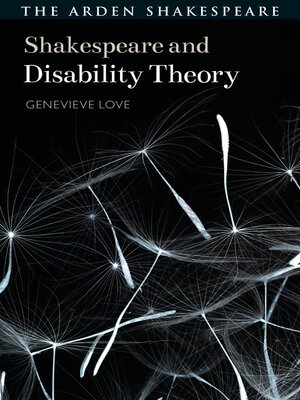
Sign up to save your library
With an OverDrive account, you can save your favorite libraries for at-a-glance information about availability. Find out more about OverDrive accounts.
Find this title in Libby, the library reading app by OverDrive.



Search for a digital library with this title
Title found at these libraries:
| Library Name | Distance |
|---|---|
| Loading... |
Shakespeare and Disability Theory serves as a guide to the intersections of Shakespeare studies and disability studies. Intervening in contemporary critical debates about recognizing disability representations in dramatic texts, Genevieve Love explores the stakes of embodying disability in Shakespearean performance.
After tracking the emergence of critical disability studies as a field, Love maps out how claims from disability theory influence and continue to transform Shakespeare studies. Through methodologies of literary disability studies, the volume provides fresh readings of a range of Shakespeare texts, illustrating the power of disability theory to reframe familiar ideas in Shakespeare and to illuminate unfamiliar ones. While the archetypal Richard III provides an extended case study that highlights performance choices by disabled actors and contemporary appropriations of disability, Love's close readings move beyond Shakespeare's representations of singular disabled characters. Plays such as Julius Caesar and King Lear display the expansive networks through which we recognize Shakespearean disability, including neurodiversity. Subsequent chapters underscore disability's intersectionality, recognized through dynamics of incorporation, care, and community in Othello and Henry V, and demonstrate how plays such as The Tempest and Titus Andronicus mobilize disability as a resource for theatricality through stage properties and theatrical prostheses. All these approaches point to engagements with literary and theatrical disability representations that challenge outmoded methods for Shakespeare students, scholars and practitioners.
After tracking the emergence of critical disability studies as a field, Love maps out how claims from disability theory influence and continue to transform Shakespeare studies. Through methodologies of literary disability studies, the volume provides fresh readings of a range of Shakespeare texts, illustrating the power of disability theory to reframe familiar ideas in Shakespeare and to illuminate unfamiliar ones. While the archetypal Richard III provides an extended case study that highlights performance choices by disabled actors and contemporary appropriations of disability, Love's close readings move beyond Shakespeare's representations of singular disabled characters. Plays such as Julius Caesar and King Lear display the expansive networks through which we recognize Shakespearean disability, including neurodiversity. Subsequent chapters underscore disability's intersectionality, recognized through dynamics of incorporation, care, and community in Othello and Henry V, and demonstrate how plays such as The Tempest and Titus Andronicus mobilize disability as a resource for theatricality through stage properties and theatrical prostheses. All these approaches point to engagements with literary and theatrical disability representations that challenge outmoded methods for Shakespeare students, scholars and practitioners.







